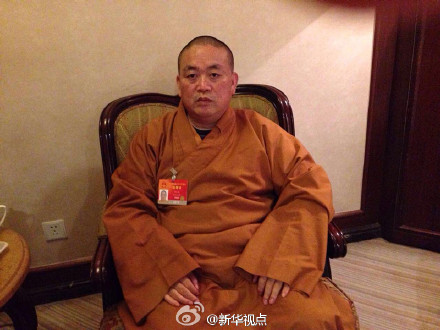Shaolin abbot responds to commercialization criticism
 0 Comment(s)
0 Comment(s) Print
Print E-mail Xinhua, March 4, 2015
E-mail Xinhua, March 4, 2015
The head of China's Shaolin Temple has distanced the Buddhist institution from media criticism claiming a planned Australian outpost of the temple will be over-commercialized.
 |
|
Shi Yongxin, abbot of China's Shaolin Temple. [Photo/Sina.com] |
Abbot Shi Yongxin told Xinhua that Shaolin will develop facilities for meditation, farming and the martial arts for which it is renowned at its "Australian culture center" in southeastern Shoalhaven City.
Australian media has reported that the center, to be built on 1,200 hectares of land bought by Shaolin, will include not only a temple and kungfu academy, but a hotel and a golf course, commercial activity apparently deviating from the spiritual essence of Buddhism.
"Many friends from the media were curious about how the Shaolin Temple could get so much money to build a golf course and a resort hotel. But the investment and planning [for the golf course and hotel] have nothing to do with Shaolin," said Shi, a member of the Chinese People's Political Consultative Conference, the country's top political advisory body, whose annual session opened on Tuesday.
The land has been opened up for lease to investors wishing to build their own developments in addition to those for which Shaolin is responsible, according to the abbot.
"If entrepreneurs see business opportunities and want to build a new community of Sino-Australia cultural cooperation, as long as the Australian government, the public and the investors are willing to do it, I just say it is destiny," he said.
Shaolin has established more than 40 culture centers around the world. Shi claimed his motivation for this expansion is "respecting religion, culture and lifestyle... promoting dialogue about culture and strengthening international understanding and cooperation".
Shi said he expects the center to open next year.
He presented a check for 4.16 million Australian dollars (3.26 million U.S. dollars) to Shoalhaven's mayor on Feb. 23, the first concrete step to establishing Shaolin's first center in Australia.
The Shaolin Temple, built in the late fifth century and located in central China's Henan Province, is the birthplace of Zen Buddhism and the cradle of Chinese kungfu.
Shi became the temple's abbot in 1999. As one of the first Chinese monks to gain an MBA, he has courted controversy for developing business operations including lucrative kungfu shows and merchandise. He is known as the "CEO monk".






Go to Forum >>0 Comment(s)